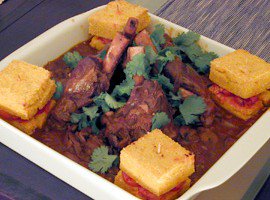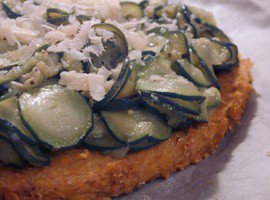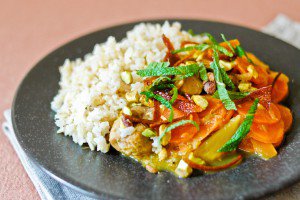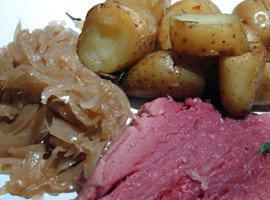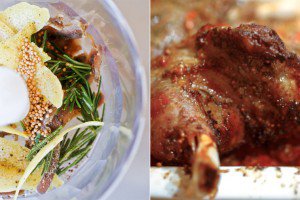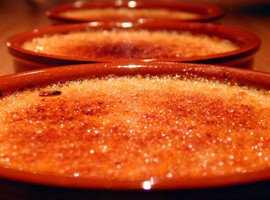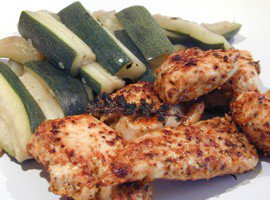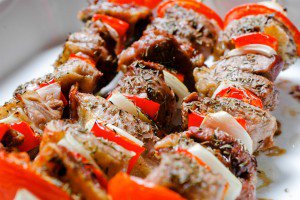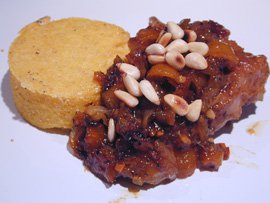
[Kumquat and Pinenut Lamb Stew, Little Polenta Cake]
Last week, I had my parents and my sister over for dinner. It had occurred to me that the four of us met most often at my parents’, and that it was high time I return the invitation, lest they start to wonder why they couldn’t benefit from at least some of the good manners it had taken them years to inculcate in me.
Just a few days before that dinner, I was right in the middle of that exciting time period when I dedicate a whole section of my brain to toy with dish ideas and assemble ingredients. At that point, I knew I was in the mood to cook lamb (maybe skewers?) and that I wanted to make something polenta (maybe little cakes?), but I was still looking for the right idea to pull them together.
And then, as I was reading the November issue of the New York Times Style Magazine, which a very kind reader had sent me, a recipe jumped out of the page and right at me. The recipe was for a candied kumquat and pinenut octopus salad (yes, it was a little scary and no, no stain on the pretty shirt I was wearing, thanks for asking).
“Candied kumquats? But I have candied kumquats!”. I had bought them a few months ago in a little spice store, thinking “Wow, candied kumquats!”, but I had never gotten around to eating them or using them in anything. I pulled those little guys out from the back of the kitchen cabinet, and they did seem a little upset and bitter from the exile — but then bitterness is a desired quality in kumquats, no?
The kumquat-pinenut pairing idea evolved into this lamb stew, in which the meat is slowly simmered in an orange juice and olive oil sauce, flavored with kumquats, onions and garlic, as well as thyme — lamb’s best herby friend. The pinenuts, toasted, make their appearance at plating time, in a grand sprinkling finale.
We loved it, and I was especially happy with the result given my very limited experience with stews. The meat turned out moist and tender, beautifully complemented by the flavorful chunky sauce and its part sweet, part bitter accents. My dear little polenta cakes marched onto the scene in a proud procession, their crispy crust revealing the softness of their warm and mellow hearts, and an excellent bottle of Pomerol 1999 brought by my father rounded out the meal.
[Update: my candied kumquats were purchased at Maison Joseph, a small graineterie at 63 rue des Abbesses in the 18th, 01 46 06 33 78.]
[2006 Update: to my great sadness, the graineterie is now closed, replaced by a .]
Mijoté d’Agneau aux Kumquats et aux Pignons
– 1kg lamb shoulder, cut in about 8 pieces
– 2 onions, thinly sliced
– the juice of 4 oranges
– 4 Tbsp olive oil
– 16 candied kumquats
– 2 cloves of garlic, peeled and chopped
– 2 tsp dried thyme
– 1/3 C pinenuts, toasted in a dry skillet
– salt, pepper
(Serves 4.)
Soak the candied kumquats in a cup of light tea for about 20 minutes. Drain and dice them.
In a medium mixing bowl, whisk together the orange juice, 3 tablespoons of olive oil, the kumquats, the garlic and the thyme. Set aside.
Heat a tablespoon of olive oil in a thick-bottomed saucepan (a cast-iron dutch oven is ideal). When the oil is hot, add in the pieces of meat, sprinkle with salt and pepper, and let brown for three to four minutes on each side, over high heat. Remove the meat and set aside on a plate. Transfer the onion slices into the pan, and cook them over high heat, stirring regularly, until softened.
Return the meat into the pan, and pour in the orange juice mixture. Turn down the heat to medium, cover and simmer for an hour. Check the amount of liquid from time to time, and add a little boiling water if you find the sauce has reduced too much.
Divide the meat between four plates, top with the sauce, sprinkle with pinenuts, and serve with little polenta cakes.
Petits Gâteaux de Polenta
– 300 g polenta (old-fashioned or instant)
– salt, pepper
(Serves 4.)
Cook polenta according to package directions (mine needs to be cooked for one hour in 0.9 liters of salted boiling water for 300 g of polenta). Season the cooked polenta with salt and pepper, and pour into a 20-cm (9-inch) nonstick cake pan, smooth out the surface with a spatula, and let cool. (Recipe can be made ahead up to this point.)
When the polenta has cooled, use a cookie cutter or a metal pastry circle to cut out little cakes. Preheat the oven to 200°C (400°F). Transfer the polenta cakes onto a cookie sheet lined with parchment paper. Bake for 12 minutes, then flip the cakes and bake for another 10 minutes, until golden and crispy. Serve immediately.
(The unused pieces of polenta can be cut in cubes, optionally sauteed, and simply added to a stew, a stir-fry or a soup.)


